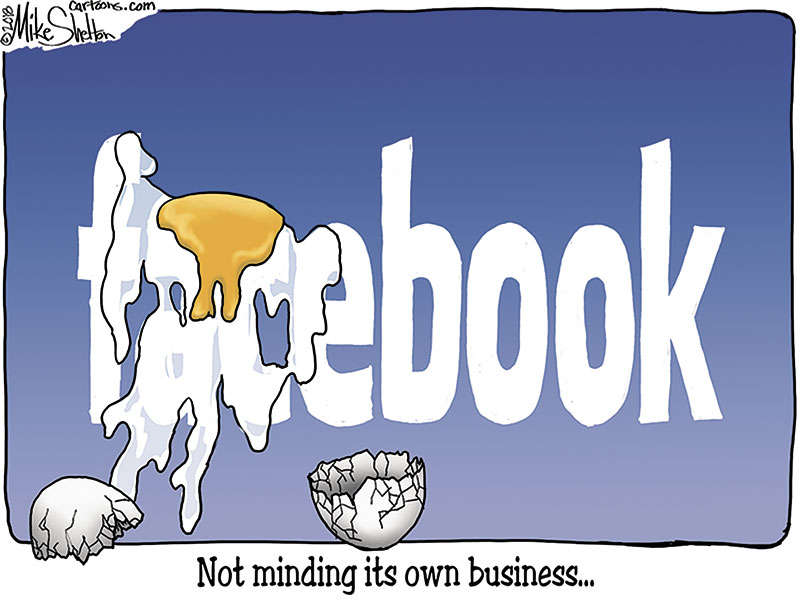Jeb Bladine: Digital giants using private information
Revelations about digital invasions of personal privacy represent warnings too long ignored.
The Guardian, a British newspaper that circulates extensively in the UK and U.S., set the scene for us in 2014:
“Google knows what you’re looking for. Facebook knows what you like. Sharing is the norm, and secrecy is out. But what is the psychological and cultural fallout from the end of privacy?”
This month, we learned about misdeeds by the British consulting firm Cambridge Analytica, abetted by Facebook. Even tech-savvy observers were stunned by the depths to which data brokers have mined private information for commercial and political profits.
Facebook stock, up 10-fold since 2012, plunged 20 percent in February and March. Google stock has slid 5 percent since mid-March. Some speculate the scandal may destroy the surreptitious business model for these digital giants.
Meanwhile, here is our “confession”: For years, we have been collecting and storing personal information — names, addresses, phone numbers and e-mail addresses. We don’t sell or give away any of that data, however. We have been using it to deliver newspapers to your homes and stories to your computers and phones.
Compare that to this: Digital data brokers have compiled online search and browsing records for tens of millions of people. Lax user practices allow systems to track physical locations and day-to-day movements.
It’s one level of mischief when that information is used to bombard us with targeted advertising on every web page. But now we learn personal data analysis is being used to identify psychological profiles that make people vulnerable to carefully crafted political and social messages.
Facebook claimed it was deceived by Cambridge Analytica. Facebook’s chief operating officer was quoted, “We know that this was a major violation of people’s trust, and I deeply regret that we didn’t do enough to deal with it.”
That prompted this comment from The Guardian:
“In highlighting the apparent deceit, the company (Facebook) has been forced to shine a light on its underlying business model and years of careless data-sharing practices … The amount of data … used to deliver targeted advertising based on personality types — including activities, interests, check-ins, location, photos, religion, politics, relationship details — was not unusual in the slightest. This was a feature, not a bug.”
People are now learning how to disable settings that let Facebook and Google track their personal information for sharing with others. Suddenly, stories are appearing with instructions to help us enhance our privacy.
Meanwhile, remember this: When you read the newspaper, it isn’t reading you back.
Jeb Bladine can be reached at jbladine@newsregister.com or 503-687-1223.











Comments
carolsm
Wait, did you folks think Facebook was a charity? You get a space online, connect with your friends, without paying any fee, and there's hardly any advertising: how do you suppose that happens? Facebook was fairly upfront from the very beginning, that they made money by selling your data. That's the trade-off you made by making an account with them.
Jeb Bladine
Reports I find online say Facebook has about $4 Billion in annual advertising revenue. Much of that no doubt comes from connecting advertisers with personal information of Facebook users.
Many people think it runs deeper than just cashing in on collections of data made available by often unsuspecting users. Here's an interesting Op-Ed article from the New York Times this week:
https://www.nytimes.com/2018/03/29/opinion/facebook-privacy-zuckerberg-society.html
Brad M
Facebook? MySpace is where its at.
Denise
$4 billion? What are are their operating expenses?Certainly more than yours. It’s obviously a lucrative company and that’s okay. Last I checked, we are a capitalist country and free to make as much money as possible.
They do advertise and keep and sell your data, like many other companies. All of which is clearly disclosed. Could they do better? Yes. But it’s a relatively young company. The fact is, is that that social media platforms are the future and print is almost dead. Keep your personal data as private as you can or don’t use the platform. It’s free after all, and certainly able to respond to breaking news and emergencies better than print. I personally prefer Twitter and rarely use Facebook and have my privacy settings maxed out.
Facebook will likely be replaced with something else soon, it’s inevitable.
Jeb Bladine
Mentioning $4 billion in advertising revenue wasn't criticism of capitalism; it responded to the statement that Facebook had to sell that personal data because "there's hardly any advertising."
I don't think many people were fully aware that Facebook provided access to private Internet surfing habits, information about your Facebook friends, and tools for psychological analysis allowing targeting of information to feed on personal biases.
If the most important value of information becomes its speed-of-delivery rather than accuracy-of-content, print may well be on its way out. But when I look in my mailbox; see the stacks of magazine in homes and offices; visit the library; look at the desks in my office; and, yes, read a newspaper, I find the obituary for print at least somewhat premature.